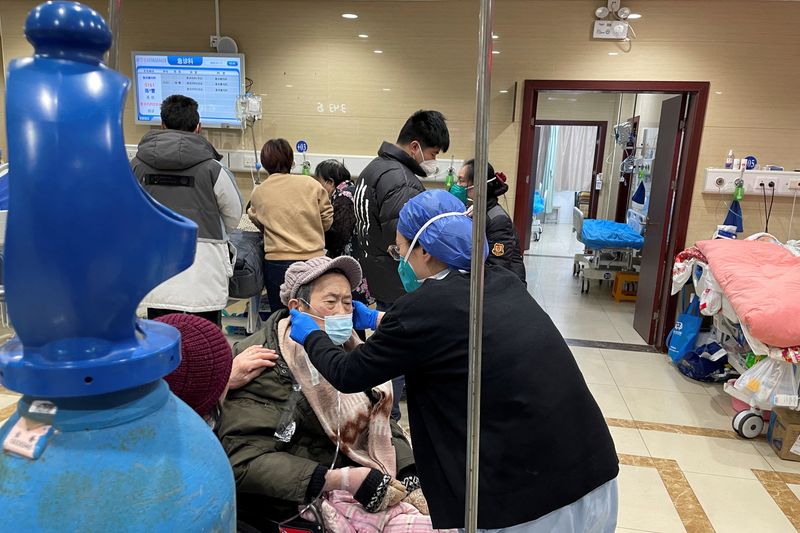By Bernard Orr
BEIJING (Reuters) - President Xi Jinping said on Wednesday he was particularly concerned about China's COVID-19 wave spreading to rural areas with poor medical facilities but he urged perseverance in stressful times, saying "light is ahead".
His comments came as millions of urban workers were travelling back to their home towns and reunite with families for the Lunar New Year (LNY) holidays, known before COVID as the greatest annual migration of people.
"China's COVID prevention and control is still in a time of stress, but the light is ahead, persistence is victory," Xi said in his LNY greetings message carried by CCTV.
"I am most worried about the rural areas and farmers. Medical facilities are relatively weak in rural areas, thus prevention is difficult and the task is arduous," Xi said, adding that the elderly were a top priority.
Xi had championed a strict zero-COVID strategy of lockdowns and other curbs on movement, which China imposed for three years at a high economic and psychological cost, before abruptly ditching it in early December soon after widespread protests.
Unleashed among the country's 1.4 billion people, the virus has disrupted factory output and consumption in the past two months, but some analysts say the deeper-than-expected shock may be followed by a faster-than-predicted recovery.
Economists are scrutinising the holiday season for glimmers of rebounding consumption across the world's second largest economy after new GDP data on Tuesday confirmed a sharp economic slowdown in China.
Prolonged sluggishness could worsen the policy challenges facing Xi, who must pacify a pessimistic younger generation who led the November protests against COVID curbs.
While some analysts expect that recovery to be slow and patchy, China's Vice-Premier Liu He declared to the World Economic Forum in Switzerland on Tuesday that China was open to the world after three years of isolation.
National Immigration Administration officials said that, on average, half a million people had moved in or out of China each day since its borders reopened on Jan. 8, state media reported. That is expected to rise to 600,000 a day once the holiday formally starts on Saturday.
But as workers flood out of megacities such as Shanghai, where officials say the virus has peaked, many are heading to towns and villages where unvaccinated elderly have yet to be exposed to COVID and health care systems are less equipped.
'LAST MILE'
As the COVID surge intensified, some were putting the virus out of their mind as they headed for the departure gates.
Travellers bustled through railway stations and subways in Beijing and Shanghai, many ferrying large wheeled suitcases and boxes stuffed with food and gifts.
"I used to be a little worried (about COVID-19)," said migrant worker Jiang Zhiguang, waiting among the crowds at Shanghai's Hongqiao Railway Station.
"Now it doesn't matter anymore. Now it's okay if you get infected. You'll just be sick for two days only," Jiang, 30, told Reuters.
Others will return to mourn relatives who have died. For some of those, that bereavement is mixed with anger over what they say was a lack of preparation to protect the vulnerable elderly before the sudden policy U-turn.
In more isolated areas far from the swift urban outbreaks, state medical workers are this week going door-to-door in some outlying villages to vaccinate the elderly, with the official Xinhua news agency describing the effort as the "last mile".
Clinics in rural villages and towns are being fitted with oxygenators, and medical vehicles have also been deployed to places considered at risk.
While authorities confirmed on Saturday a huge increase in deaths - announcing that nearly 60,000 people with COVID had died in hospitals between Dec. 8 and Jan. 12 - state media said that heath officials were not yet ready to give the World Health Organization (WHO) the extra data it is now seeking.
Specifically, the U.N. agency wants information on so-called excess mortality - the number of all deaths beyond the norm during a crisis, the WHO told Reuters in a statement on Tuesday.

The Global Times, a tabloid published by the official People's Daily, quoted Chinese experts as saying the China Center for Disease Control and Prevention was already monitoring such data, but it would take time before it could be released.
Doctors in both public and private hospitals are being actively discouraged from attributing deaths to COVID, Reuters reported on Tuesday.